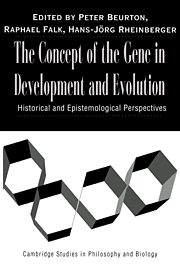Book contents
- Frontmatter
- Contents
- Introduction
- List of Authors
- PART ONE GENES AND TRAITS
- PART TWO EXTRACTING THE UNITS OF HEREDITY
- PART THREE GENETIC PROGRAMS AND DEVELOPMENTAL GENES
- 7 Decoding the Genetic Program: Or, Some Circular Logic in the Logic of Circularity
- 8 Genes Classical and Genes Developmental: The Different Use of Genes in Evolutionary Syntheses
- 9 The Developmental Gene Concept: History and Limits
- PART FOUR CONCEPTUAL PERSPECTIVES
- FINAL REVIEW
- Glossary
- Index
8 - Genes Classical and Genes Developmental: The Different Use of Genes in Evolutionary Syntheses
from PART THREE - GENETIC PROGRAMS AND DEVELOPMENTAL GENES
Published online by Cambridge University Press: 12 January 2010
- Frontmatter
- Contents
- Introduction
- List of Authors
- PART ONE GENES AND TRAITS
- PART TWO EXTRACTING THE UNITS OF HEREDITY
- PART THREE GENETIC PROGRAMS AND DEVELOPMENTAL GENES
- 7 Decoding the Genetic Program: Or, Some Circular Logic in the Logic of Circularity
- 8 Genes Classical and Genes Developmental: The Different Use of Genes in Evolutionary Syntheses
- 9 The Developmental Gene Concept: History and Limits
- PART FOUR CONCEPTUAL PERSPECTIVES
- FINAL REVIEW
- Glossary
- Index
Summary
ABSTRACT
Dobzhansky (1964) stated that “Nothing in biology makes sense except in the light of evolution,” and the function of the gene is no exception. The use of genes in population genetics and developmental genetics differs significantly. This is reflected in the roles that genes are postulated to play in evolution. In the Modern Synthesis of population genetics and evolution, genes become manifest by differences in alleles that are active in conferring differential reproductive success in adult individuals. The gene is thought to act as a particulate, atomic unit. In current syntheses of evolution and developmental genetics, important genes are manifest by their similarities across distantly related phyla, and they are active in the construction of embryos. These developmental genes are thought to act in a contextdependent network. In the population genetics model of evolution, mutations in genes provide insights into the mechanisms for natural selection and microevolution. Different individuals will be selected and their genes will be represented in higher proportions in the next generation. For the developmental geneticist, mutations in the genes provide insights into the mechanisms of phylogeny and macroevolution. Different modes of regulation may enable the production of new types of structures or the modification of existing ones. The importance of developmental approaches to the role of genes is exemplified by the discovery and subsequent analysis of the developmental gene MyoD.
The concept of the gene has had its own radiation once it entered into the territory of developmental biology.
- Type
- Chapter
- Information
- The Concept of the Gene in Development and EvolutionHistorical and Epistemological Perspectives, pp. 178 - 192Publisher: Cambridge University PressPrint publication year: 2000
- 10
- Cited by



